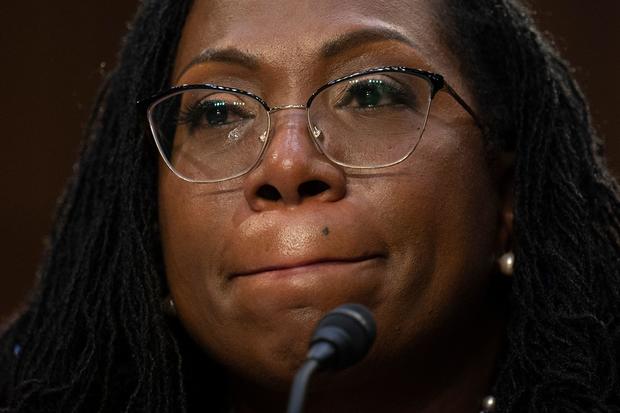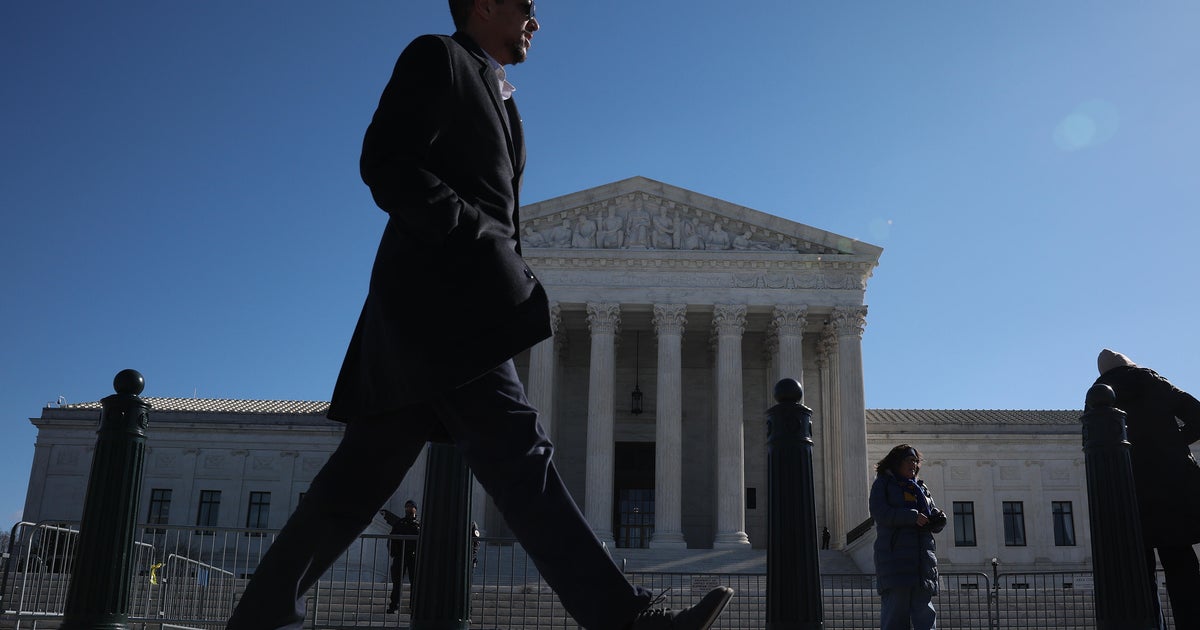6 takeaways from Ketanji Brown Jackson's Supreme Court confirmation hearings
Washington — Judge Ketanji Brown Jackson, President Biden's nominee to the Supreme Court, finished a taxing marathon of questioning before the Senate Judiciary Committee on Wednesday night, with Democrats feeling confident she is poised to become the first Black woman confirmed to the nation's highest court.
Fielding questions from the committee's 22 members for nearly 24 hours in total over the course of two days, Jackson countered claims from Republicans that she had a pattern of handing down light sentences to child pornography offenders and attempts to paint her as an activist judge who is outside the mainstream.
But the attacks appear to have done little to derail Jackson's confirmation — or move the needle for many Republicans — and Democrats walked away from the question-and-answer sessions frustrated with their GOP colleagues but steadfast that Jackson was successful in weathering their accusations.
"She will be confirmed," Sen. Patrick Leahy, a Democrat from Vermont, told reporters Wednesday night. "She will be a star on the Supreme Court."
A vote by the Judiciary panel to advance Jackson's nomination is expected April 4, committee Chairman Dick Durbin, a Democrat from Illinois, said Wednesday. Democratic leaders are aiming for the full Senate vote to confirm Jackson to take place before a two-week recess that begins April 8.
Here are the top takeaways from Jackson's confirmation hearings:
GOP brings culture war issues to confirmation battle
For some Republican senators, particularly those who are expected to make a run for the White House in 2024, their first rounds of questioning Tuesday saw them put culture war issues front and center.
Critical race theory, guns, abortion and gender were just some of the topics raised by Republican senators, as well as proposals to add seats to the Supreme Court.
Sen. Ted Cruz, a Republican from Texas, asked Jackson to explain her understanding of critical race theory, why she referenced it in a 2015 speech and if it's taught in K-12 schools.
Jackson told Cruz that critical race theory "doesn't come up in my work as a judge. It's never something I've studied or relied on, and it wouldn't be something that I would rely on if I were on the Supreme Court."
After Cruz brandished numerous children's books during his questioning, Jackson said she has not reviewed any of the books or the ideas he raised.
"They don't come up in my work as a judge, which I'm respectfully here to address," she said.
Sen. Marsha Blackburn, a Republican from Tennessee, hit on a whole slew of politically charged issues, including critical race theory, transgender athletes and gender identity.
Blackburn asked Jackson to "provide a definition for the word 'woman.'"
"I'm not a biologist," she replied.
"The fact that you can't give me a straight answer about something as fundamental as what a woman is underscores the dangers of the kind of progressive education that we are hearing about," Blackburn retorted.
Durbin rebuked Republicans for some of their lines of questioning, telling Jackson her nomination is a "testing ground for conspiracy theories and culture war theories."
"The more bizarre the charges against you and your family, the more I understand the social media scoreboard lit up yesterday," he said Wednesday.
Jackson declines to put a label on her judicial philosophy
Numerous senators sought to decipher whether there is a specific philosophy that guides Jackson in her approach to decisions, namely whether she hews to originalism, the judicial philosophy the conservative Supreme Court justices adhere to, or believes in a so-called living Constitution.
Originalists believe the Constitution should be interpreted as to its original meaning at the time it was adopted. Under the living Constitution theory, the meaning of the founding document evolves over time.
Jackson repeatedly declined to put a specific label on her judicial philosophy, instead saying she employs a methodology developed and refined over her years on the federal bench, first as a district judge, and now as a judge on a federal appeals court.
That process begins with "clearing my mind of any preconceived notions about how the case might come out and setting aside any personal views," she said.
Jackson told the committee she then reads the relevant briefs and listens to arguments, and then applies the law to the facts of the case.
"My philosophy is one in which I look at cases impartially, consistent with my independence as a judicial officer. I understand my limited role in the constitutional scheme and therefore take very seriously all of the constraints on the exercises of my authority that exist in our system," she said.
It's unclear whether her answers will satisfy some Senate Republicans like Sen. Ben Sasse, a Republican from Nebraska, who sought to drill down on Jackson's judicial philosophy and said it's in the "American civic interest" for the public to understand different approaches to the law.
But Sen. Sheldon Whitehouse, a Democrat from Rhode Island, said a judicial philosophy "can be a screen for a predisposition that judges, frankly, should not have."
Proceedings reveal deep scars over Kavanaugh's treatment
It's been three years since Justice Brett Kavanaugh appeared before the Senate Judiciary Committee for brutal confirmation hearings that were upended by allegations of sexual misconduct, which Kavanaugh vehemently denied.
But for Republicans on the Judiciary Committee, the frustrations stemming from Democrats' handling of his confirmation process are still simmering.
On Monday, most of the 11 GOP senators invoked Kavanaugh's proceedings in their opening statements, and Sen. Lindsey Graham, a Republican from South Carolina, also referenced Democrats' treatment of Justice Amy Coney Barrett and Judge Janice Rogers Brown, a former judge on the U.S. Court of Appeals for the District of Columbia Circuit whose nomination to that court was filibustered for two years.
"There are two standards going on here," Graham said. "If you're an African-American conservative woman, you're fair game to have your life turned upside down, to be filibustered, no matter how qualified you are. And if you express your faith as a conservative, all of a sudden, you're a nut."
Sen. Mike Lee, a Republican from Utah, warned "engaging in the politics of personal destruction is not something we should ever aspire to.
"When we're focused on things that we have no business doing, like bringing forward spurious, last-minute, uncorroborated accusations of a personal nature, we neglect the importance of talking about the jurisprudential role, the philosophy that guides individual jurists," he said.
"Soft on crime" accusations lead to sparring over access to records
Jackson's record sentencing child pornography offenders while serving as a judge on the federal district court in Washington was a significant focus of questions for GOP members of the Judiciary Committee. Republicans homed in on seven cases in which they claimed Jackson's sentences were far lighter than federal guidelines or prosecutors recommended.
The 2013 case of Wesley Hawkins was repeatedly raised by Cruz and Sen. Josh Hawley, a Republican from Missouri who last week previewed this line of attack against Jackson. Hawkins was 18 years old when he was found to be in possession of nearly two dozen images and movie files containing child pornography. The federal government recommended Hawkins be incarcerated for 24 months, and Jackson sentenced him to three months in prison followed by 73 months of supervised release.
Jackson said that as a trial judge, she was required by Congress under the law to impose a sentence that is "sufficient, but not greater than necessary," to promote the purposes of punishment.
"I have law enforcement in my family. I'm a mother who has daughters, who took these cases home with me at night because they are so graphic in terms of the kinds of images that you are describing," she said, adding that she is "fully aware of the seriousness of this offense, and also my obligation to take into account all of the various aspects of the crime as Congress has required me to do and I made a determination seriously in each case."
Graham had a particularly heated exchange with Jackson about her sentencing record in child pornography cases and urged harsher sentences for offenders to deter the viewing of illicit images.
"Your view of how to deter child pornography is not my view," Graham told Jackson. "I think you are doing it wrong and every judge who does what you are doing is making it easier for the children to be exploited."
Jackson told Republicans criticizing her sentencing record that they did not have access to all filings that helped inform her decisions, including the pre-sentencing reports prepared and given to judges before sentencing.
Ten of the committee's 11 GOP members requested access to the reports, which are filed under seal since they contain highly sensitive information, including about victims. Only Sasse did not sign on to a letter seeking the documents.
But Durbin rejected the request, even for senators to view the filings in a classified setting with information redacted, saying allowing their examination would be unprecedented and a "bridge too far."
"The information contained in these reports is dangerous, dangerous to the victims, and to the innocent people who are mentioned in these reports and unnecessary at this point," Durbin said. "It's merely a fishing expedition in dangerous territory."
Jackson to recuse herself from Harvard affirmative action case if confirmed
A significant piece of news that was revealed during Jackson's appearance Wednesday is that she plans to recuse herself from an upcoming case to be heard by the Supreme Court involving Harvard's admissions policies if confirmed.
"If you're confirmed, do you intend to recuse from this lawsuit?" Cruz asked Jackson.
"That is my plan, senator," she replied.
Jackson is a member of the Harvard Board of Overseers, one of the elite school's two governing boards, and has faced calls to step aside from the dispute before the Supreme Court if she is confirmed. She began her term on the panel in 2016 and it expires in the spring.
The justices will hear the affirmative action cases involving the admissions policies at Harvard, a private institution, and the University of North Carolina, a public school, in its next term, which begins in October.
Senators hail historic nature of Jackson's nomination
Jackson is the first Black woman to be nominated to the Supreme Court and, if she is confirmed by the Senate, will be the first Black woman to sit on the nation's highest court. Her appointment will also mark the first time four women will serve at the same time and bring the Supreme Court the closest to gender parity it has ever been.
"You have earned this spot. You are worthy. You are a great American," Sen. Cory Booker, a Democrat from New Jersey, told Jackson in an impassioned speech, during which she became visibly emotional.
Jackson, too, demonstrated the arc of the nation's history through the story of her life and that of her parents — from her mother and father attending segregated schools in Florida to Jackson being poised to become the first Black woman to sit on the nation's highest court.
"I hope to inspire people to try to follow this path because I love this country, because I love the law, because I think it is important that we all invest in our future," Jackson said in response to a question from Democratic Sen. Alex Padilla of California, wiping away a tear. "And the young people are the future, and so I want them to know that they can do and be anything."
Jackson recalled an interaction she had with a Black woman during her freshman year at Harvard University, when she was feeling homesick and questioning whether she could succeed there.
"A Black woman I did not know was passing me on the sidewalk and she looked at me, and I guess she knew how I was feeling, and she leaned over as we crossed and said, 'Persevere.' I would tell them to persevere," she said of her advice to young people.






